可数名词和不可数名词英文讲解
- 格式:doc
- 大小:54.00 KB
- 文档页数:4
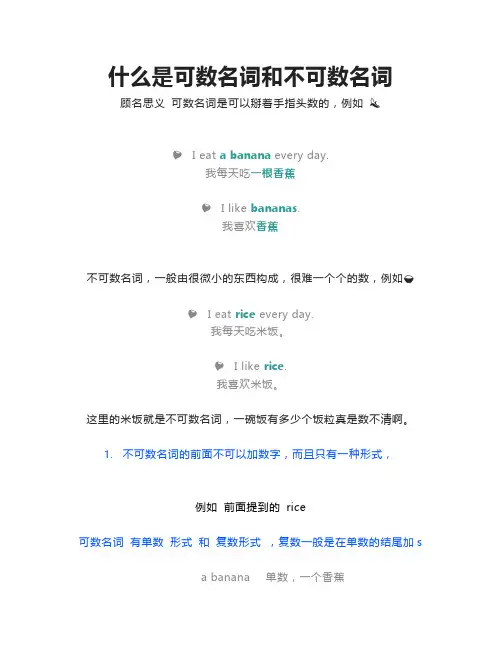
什么是可数名词和不可数名词顾名思义可数名词是可以掰着手指头数的,例如I eat a banana every day.我每天吃一根香蕉I like bananas.我喜欢香蕉不可数名词,一般由很微小的东西构成,很难一个个的数,例如I eat rice every day.我每天吃米饭。
I like rice.我喜欢米饭。
这里的米饭就是不可数名词,一碗饭有多少个饭粒真是数不清啊。
1. 不可数名词的前面不可以加数字,而且只有一种形式,例如前面提到的rice可数名词有单数形式和复数形式,复数一般是在单数的结尾加sa banana 单数,一个香蕉three bananas 复数,三个香蕉moreKate was singing a song.Kate 正在唱一首歌。
(可数名词单数)Do you have a ten-dollar note?你有没有一张10美元的纸币?(可数名词单数)It wasn't your fault. It was an accident.这不是你的错。
这是一场事故。
(可数名词单数)There are no batteries in the radio.收音机里没有电池。
(可数名词复数)We don't have enough cups.我们没有足够的杯子。
(可数名词复数)Kate was listening to music.Kate在听音乐。
(不可数名词)There's sand in my shoes.我鞋里面有沙子。
(不可数名词)Do you have any money?你有钱吗?(不可数名词)There is no electricity in this house.这个房子没有电。
(不可数名词)We don't have enough water.我们没有足够的水。
(不可数名词)2. 可数名词前面可以加数字,或者冠词a /an/the,但是可数名词不可以单独使用。
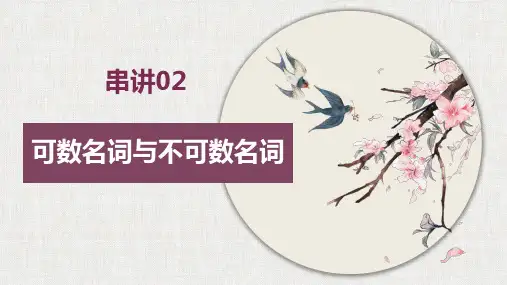

更多免费学习资料,欢迎关注微信公众号:考试笔记可数名词和不可数名词的常考点一、可数名词1. 可数名词有哪些语法特点如果一个名词是可数的,那么它就可以用不定冠词来修饰,或用数词来修饰,并且可以有复数形式。
如:A tree has fallen across the road. 一株树倒下横在路上。
Our house has five rooms. 我们的房子有5个房间。
2. 可数名词有哪些常用修饰语通常用于修饰可数名词的修饰语有some, any, many, few, a few, a lot of, lots of, plenty of, a great many, a great number of等修饰。
如:I have lived here for many years. 我在这里住了好多年了。
Remember to buy some stamps, won’t you?记着买些邮票好吗?Plenty of shops open on Sunday mornings. 周日上午很多商店营业。
A great many people were at the meeting. 很多人参加了会议。
A great number of our students are American. 我们的学生中有许多是美国人。
注意:其中的some, any, a lot of, lots of, plenty of既可用于修饰可数名词,也可用于修饰不可数名词;而其中的many, few, a few, a great many, a great number of则只用于修饰可数名词,不用于修饰不可数名词。
二、不可数名词1.如果一个名词是不可数的,那么它就不可以用不定冠词来修饰,也不可以用数词来修饰,同时也没有复数形式。
如:夏天在海里游泳是一大乐趣。
误:Swimming in the sea is a great fun in summer.正:Swimming in the sea is great fun in summer.这本书包含许多有用的信息。
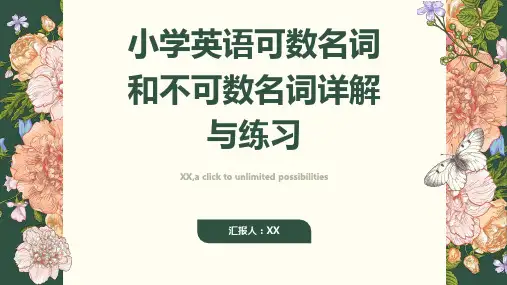

Unit 7 How do you make a banana smoothie1. 可数名词和不可数名词(Countable noun and Uncountable noun. )从名词的数上划分,英语名词可分为可数名词和不可数名词。
可数名词有单数和复数两种形式。
可数名词的单数可以与冠词a/an 连用。
不可数名词一般没有复数形式,不能与a / an 连用。
在这里,我们重点讲述不可数名词。
(1)不可数名词包括各种物质的统称。
eg. bread 面包stone石头beer啤酒water水cream奶油wood木头jam果酱ice 冰paper纸oil油soap肥皂glass玻璃tea茶gold黄金(2)抽象名词也是不可数名词advice 主意/忠告death死亡beauty美丽、漂亮help帮助(3)在英文中下列名词也是不可数名词baggage 行李furniture家具weather气候information信息knowledge知识news新闻(4)不可数名词没有复数形式,不能与a / an 连用,在前面往往加上some(一些),any (任何), no (没有),a little (少许)等词,或与量词搭配,组成短语。
eg. <1>I don’t want any advice or help . I want some information.<2>a piece of news . 一条消息a drop of oil 一滴油a cake of soap 一块肥皂a cup of tea 一杯茶two slices of bread 两片面包three teaspoons of mayonnaise 三茶匙蛋黄酱(5)英语名词的可数或不可数,不要从汉语本身去理解,要根据英语的习惯和特点判断、记忆。
例如:money是不可数名词,dollar则是可数名词。
eg. I have much money . 我有许多钱He has many dollars 他有许多美元。
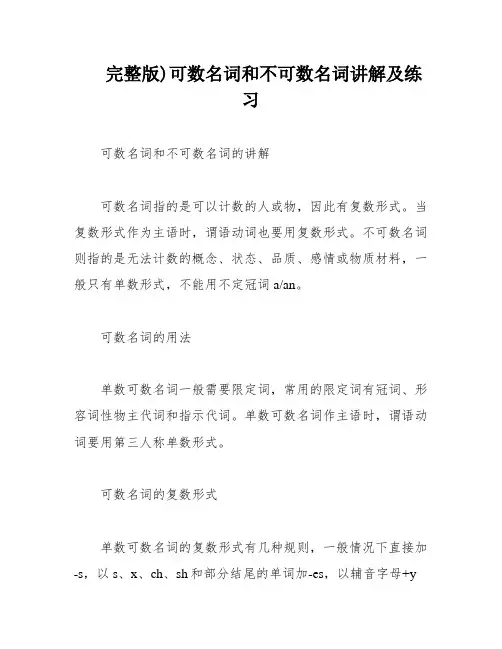
完整版)可数名词和不可数名词讲解及练习可数名词和不可数名词的讲解可数名词指的是可以计数的人或物,因此有复数形式。
当复数形式作为主语时,谓语动词也要用复数形式。
不可数名词则指的是无法计数的概念、状态、品质、感情或物质材料,一般只有单数形式,不能用不定冠词a/an。
可数名词的用法单数可数名词一般需要限定词,常用的限定词有冠词、形容词性物主代词和指示代词。
单数可数名词作主语时,谓语动词要用第三人称单数形式。
可数名词的复数形式单数可数名词的复数形式有几种规则,一般情况下直接加-s,以s、x、ch、sh和部分结尾的单词加-es,以辅音字母+y结尾的单词变y为i再加-es,以f或fe结尾的单词变f或fe为v再加-es,以o结尾的单词通常加s。
有些单数可数名词的复数形式是不规则的,需要记忆。
不可数名词的用法不可数名词没有复数形式,不能用不定冠词a/an,常用的限定词有定冠词the和一些量词如some、any、much、little等。
不可数名词作主语时,谓语动词要用单数形式。
改写后的文章:可数名词和不可数名词是英语语法中的重要概念。
可数名词指的是可以计数的人或物,有复数形式,而不可数名词则是无法计数的概念、状态、品质、感情或物质材料,只有单数形式。
在使用中,可数名词需要限定词,常见的限定词有冠词、形容词性物主代词和指示代词。
单数可数名词作主语时,谓语动词要用第三人称单数形式。
可数名词的复数形式有几种规则,但也有一些不规则的复数形式需要记忆。
不可数名词没有复数形式,不能用不定冠词a/an,常用的限定词有定冠词the和一些量词。
不可数名词作主语时,谓语动词要用单数形式。
A。
wereB。
was C。
areD。
is3.Howmany students are there in your class?A。
isB。
are C。
amD。
be4.Thereis milk in the fridge.A。
someB。
any C。
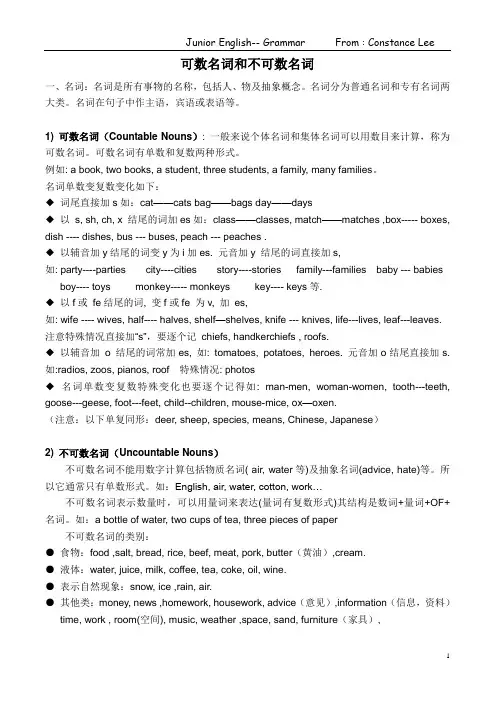
可数名词和不可数名词一、名词:名词是所有事物的名称,包括人、物及抽象概念。
名词分为普通名词和专有名词两大类。
名词在句子中作主语,宾语或表语等。
1) 可数名词(Countable Nouns): 一般来说个体名词和集体名词可以用数目来计算,称为可数名词。
可数名词有单数和复数两种形式。
例如: a book, two books, a student, three students, a family, many families。
名词单数变复数变化如下:◆词尾直接加s如:cat——cats bag——bags day——days◆以s, sh, ch, x 结尾的词加es如:class——classes, match——matches ,box----- boxes, dish ---- dishes, bus --- buses, peach --- peaches .◆以辅音加y结尾的词变y为i加es. 元音加y 结尾的词直接加s,如: party----parties city----cities story----stories family---families baby --- babies boy---- toys monkey----- monkeys key---- keys等.◆以f或fe结尾的词, 变f或fe 为v, 加es,如: wife ---- wives, half---- halves, shelf—shelves, knife --- knives, life---lives, leaf---leaves. 注意特殊情况直接加“s”,要逐个记chiefs, handkerchiefs , roofs.◆以辅音加o 结尾的词常加es, 如: tomatoes, potatoes, heroes. 元音加o结尾直接加s. 如:radios, zoos, pianos, roof 特殊情况: photos◆名词单数变复数特殊变化也要逐个记得如: man-men, woman-women, tooth---teeth, goose---geese, foot---feet, child--children, mouse-mice, ox—oxen.(注意:以下单复同形:deer, sheep, species, means, Chinese, Japanese)2) 不可数名词(Uncountable Nouns)不可数名词不能用数字计算包括物质名词( air, water等)及抽象名词(advice, hate)等。
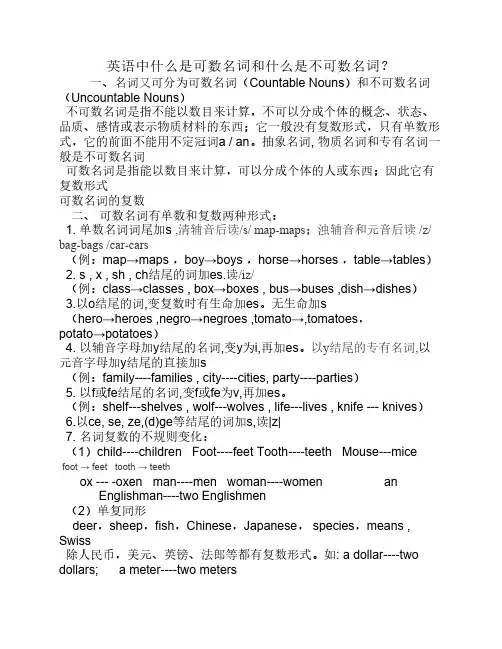
英语中什么是可数名词和什么是不可数名词?一、名词又可分为可数名词(Countable Nouns)和不可数名词(Uncountable Nouns)不可数名词是指不能以数目来计算,不可以分成个体的概念、状态、品质、感情或表示物质材料的东西;它一般没有复数形式,只有单数形式,它的前面不能用不定冠词a / an。
抽象名词, 物质名词和专有名词一般是不可数名词可数名词是指能以数目来计算,可以分成个体的人或东西;因此它有复数形式可数名词的复数二、可数名词有单数和复数两种形式:1. 单数名词词尾加s ,清辅音后读/s/ map-maps;浊辅音和元音后读 /z/ bag-bags /car-cars(例:map→maps ,boy→boys ,horse→horses ,table→tables) 2. s , x , sh , ch结尾的词加es.读/iz/(例:class→classes , box→boxes , bus→buses ,dish→dishes)3.以o结尾的词,变复数时有生命加es。
无生命加s(hero→heroes ,negro→negroes ,tomato→,tomatoes,potato→potatoes)4. 以辅音字母加y结尾的名词,变y为i,再加es。
以y结尾的专有名词,以元音字母加y结尾的直接加s(例:family----families , city----cities, party----parties)5. 以f或fe结尾的名词,变f或fe为v,再加es。
(例:shelf---shelves , wolf---wolves , life---lives , knife --- knives)6.以ce, se, ze,(d)ge等结尾的词加s,读|z|7. 名词复数的不规则变化:(1)child----children Foot----feet Tooth----teeth Mouse---mice foot → feet tooth → teethox --- -oxen man----men woman----women an Englishman----two Englishmen(2)单复同形deer,sheep,fish,Chinese,Japanese, species,means , Swiss除人民币,美元、英镑、法郎等都有复数形式。
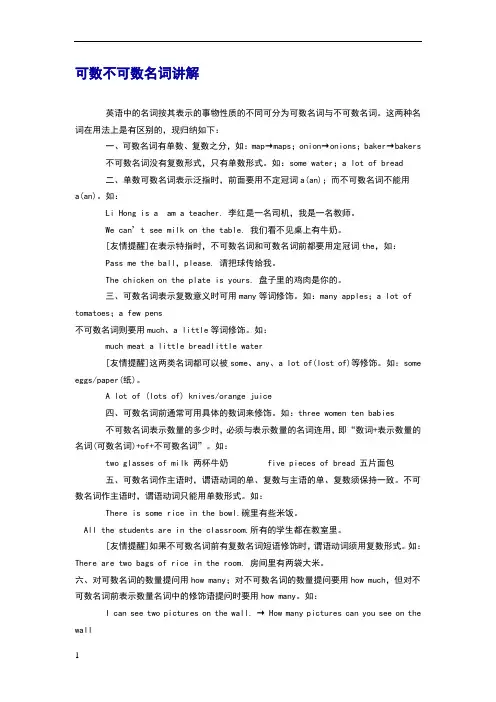
可数不可数名词讲解英语中的名词按其表示的事物性质的不同可分为可数名词与不可数名词。
这两种名词在用法上是有区别的,现归纳如下:一、可数名词有单数、复数之分,如:map→maps;onion→onions;baker→bakers不可数名词没有复数形式,只有单数形式。
如:some water;a lot of bread二、单数可数名词表示泛指时,前面要用不定冠词a(an);而不可数名词不能用a(an)。
如:Li Hong is a am a teacher. 李红是一名司机,我是一名教师。
We can’t see milk on the table. 我们看不见桌上有牛奶。
[友情提醒]在表示特指时,不可数名词和可数名词前都要用定冠词the,如:Pass me the ball,please. 请把球传给我。
The chicken on the plate is yours. 盘子里的鸡肉是你的。
三、可数名词表示复数意义时可用many等词修饰。
如:many apples;a lot of tomatoes;a few pens不可数名词则要用much、a little等词修饰。
如:much meat a little breadlittle water[友情提醒]这两类名词都可以被some、any、a lot of(lost of)等修饰。
如:some eggs/paper(纸)。
A lot of (lots of) knives/orange juice四、可数名词前通常可用具体的数词来修饰。
如:three women ten babies不可数名词表示数量的多少时,必须与表示数量的名词连用,即“数词+表示数量的名词(可数名词)+of+不可数名词”。
如:two glasses of milk 两杯牛奶 five pieces of bread 五片面包五、可数名词作主语时,谓语动词的单、复数与主语的单、复数须保持一致。
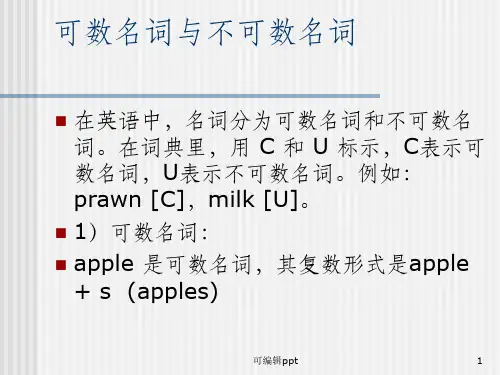
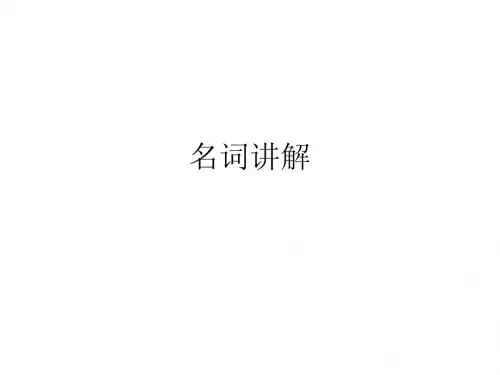
英文中的不可数名词与可数名词1.不可数名词Some nouns in English are uncountable nouns.英语中有些单词是不可数名词。
We do not use uncountable nouns in the plural and we do not use them with the indefinite article, a/an.不可数名词没有复数形式,我们也不用不定冠词a/an修饰他们。
We ate a lot of foods > We ate a lot of foodWe bought some new furnitures > We bought some new furniture.That’s a useful information > That’s useful informationWe can use some quantifiers with uncountable nouns:我们可以用某些量词修饰不可数名词:He gave me some useful advice.They gave us a lot of information.Uncountable nouns often refer to:不可数名词有一下类别:Substances: food; water; wine; salt; bread; ironHuman feelings or qualities: anger; cruelty; happiness; honesty; pride; Activities: help; sleep; travel; workAbstract ideas: beauty; death; fun; lifeCommon uncountable nouns常见的不可数名词There are some common nouns in English, like accommodation, which are uncountable nouns even though they have plurals in other languages:英语中有许多名词,如accommodation,是不可数名词,但它在其他语言中有复数形式:2.可数名词Count nouns have two forms: singular and plural.可数名词有两种形式:单数和复数。
常用不可数名词(Uncountable Nouns)water水coffee咖啡tea茶juice果汁wine葡萄酒beer啤酒ice冰oil油bread面包cream奶油jam果酱gin杜松子酒furniture家具paper纸cloth布glass玻璃sand沙soap肥皂wood木头dust尘土stone石头gold黄金work工作baggage / luggage行李camping露营parking停车shopping购物weather气候fear担心horror恐惧suspicion猜疑courage勇气mercy仁慈pity同情beauty美丽,漂亮damage损害death死亡help帮助hope希望relief救济information消息/信息experience经验knowledge知识advice忠告/主意a bit of news一件消息 a cake of soap一块肥皂 a drop of oil一滴油a grain of sand一粒沙子 a pane of glass一块玻璃 a piece of advice一条忠告a pot of jam一罐果酱 a sheet of paper一页纸 a box of milk一盒牛奶表示名词复数,在中文方面显得很简单,如:一个苹果、五个苹果;一座桥、两座桥;一匹马、五十匹马……名词完全相同。
英文名词的复数表示法就复杂得多了,往往让初学者感到混淆。
下面是名词复数的常见形式。
一、最常见的名词复数(Plural)就是在单数(Singular)名词后边加上一个sboy boys cat cats room rooms horse horses tree trees rose roses二、如果名词是以sh,ch,s或x结尾的话,那就要在单数的后面加上eslash lashes 鞭子push pushes 推, 推动, 奋发, 干劲, 进取心, 攻击branch branches 分支,分支机构match matchescoach coaches 教练gas gasesass asses 驴子class classesbox boxes fox foxes三、如果名词结尾是一个子音(consonant,就是除了a,e,i,o,u之外的字母)加一个y,那就要将y换成i,再加上esbaby babies family familiespony ponies 小型马city citiescountry countries四、可是,如果名词结尾是一个母音(vowel,就是a,e,i,o,u)加一个y,那只要在单数词后加一个s就成了play plays way waysvalley valleys 山谷donkey donkeystoy toys boy boysguy guys五、当单数名词的结尾是f或fe时,复数的写法就是将f改为v,再加esthief thieves shelf shelves 架子, 搁板leaf leaves calf calves 小牛, 小牛皮, 小腿half halves wolf wolveswife wives life lives可是,f结尾的单数字,有许多只需加个s就成复数(你看,这又是英文的bugs)roof roofs hoof hoofs 蹄chief chiefs cliff cliffs 悬崖, 绝壁gulf gulfs六、结尾是o的单数词,一部份只加s就成复数词,但有的却需加es。
英语中什么是可数名词和什么是不可数名词?一、名词又可分为可数名词(Countable Nouns)和不可数名词(Uncountable Nouns)不可数名词是指不能以数目来计算,不可以分成个体的概念、状态、品质、感情或表示物质材料的东西;它一般没有复数形式,只有单数形式,它的前面不能用不定冠词a / an。
抽象名词, 物质名词和专有名词一般是不可数名词可数名词是指能以数目来计算,可以分成个体的人或东西;因此它有复数形式可数名词的复数二、可数名词有单数和复数两种形式:1. 单数名词词尾加s ,清辅音后读/s/ map-maps;浊辅音和元音后读/z/ bag-bags /car-cars(例:map→maps ,boy→boys ,horse→horses ,table→tables)2. s , x , sh , ch结尾的词加es.读/iz/(例:class→classes , box→boxes , bus→buses ,dish→dishes)3.以o结尾的词,变复数时有生命加es。
无生命加s(hero→heroes ,negro→negroes ,tomato→,tomatoes,potato→potatoes)4. 以辅音字母加y结尾的名词,变y为i,再加es。
以y结尾的专有名词,以元音字母加y结尾的直接加s(例:family----families , city----cities, party----parties)5. 以f或fe结尾的名词,变f或fe为v,再加es。
(例:shelf---shelves , wolf---wolves , life---lives , knife --- knives)6.以ce, se, ze,(d)ge等结尾的词加s,读|z|7. 名词复数的不规则变化:(1)child----children Foot----feet Tooth----teethMouse---mice foot → feet tooth → teethox --- -oxen man----men woman----womenan Englishman----two Englishmen(2)单复同形deer,sheep,fish,Chinese,Japanese,species,means , Swiss除人民币,美元、英镑、法郎等都有复数形式。
Countable Nouns
Countable nouns are easy to recognize. They are things that we can count. For example: "pen". We can count pens. We can have one, two, three or more pens. Here are some more countable nouns:
•dog, cat, animal, man, person
•bottle, box, litre
•coin, note, dollar
•cup, plate, fork
•table, chair, suitcase, bag
Countable nouns can be singular or plural:
•My dog is playing.
•My dogs are hungry.
We can use the indefinite article a/an with countable nouns:
•A dog is an animal.
When a countable noun is singular, we must use a word like a/the/my/this with it:
•I want an orange. (not I want orange.)
•Where is my bottle? (not Where is bottle?)
When a countable noun is plural, we can use it alone:
•I like oranges.
•Bottles can break.
We can use some and any with countable nouns:
•I've got some dollars.
•Have you got any pens?
We can use a few and many with countable nouns:
•I've got a few dollars.
•I haven't got many pens.
"People" is countable. "People" is the plural of "person". We can count people:
•There is one person here.
•There are three people here.
Uncountable Nouns
Uncountable nouns are substances, concepts etc that we cannot divide into separate elements. We cannot "count" them. For example, we cannot count "milk". We can count "bottles of milk" or "litres of milk", but we cannot count "milk" itself. Here are some more uncountable nouns:
•music, art, love, happiness
•advice, information, news
•furniture, luggage
•rice, sugar, butter, water
•electricity, gas, power
•money, currency
We usually treat uncountable nouns as singular. We use a singular verb. For example:
•This news is very important.
•Your luggage looks heavy.
We do not usually use the indefinite article a/an with uncountable nouns. We cannot say "an information" or "a music". But we can say a something of:
• a piece of news
• a bottle of water
• a grain of rice
We can use some and any with uncountable nouns:
•I've got some money.
•Have you got any rice?
We can use a little and much with uncountable nouns:
•I've got a little money.
•I haven't got much rice.
Uncountable nouns are also called "mass nouns".
Here are some more examples of countable and uncountable nouns:
Nouns that can be Countable and Uncountable
Sometimes, the same noun can be countable and uncountable, often with a change of meaning.
•Two teas and one coffee please.。